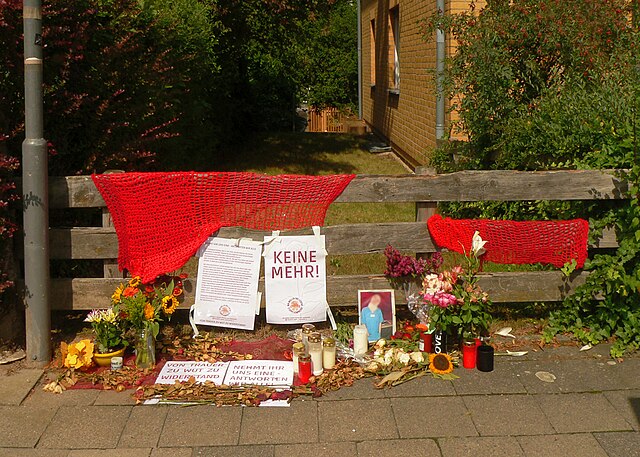Rebellious Daughters of History #24
by Judy Cox

‘We are Lions’’: Jayaben Desai (1933 – 2010)
Jayaben Desai was born in 1933 in Gujarat, India. She later migrated to Britain, where she took up low-paid work, first as a sewing machinist, then processing film in the Grunwick factory.
There was no union allowed at Grunwick, where the white management controlled the workers through threats, racist insults and harassment. On 20 August 1976, Mrs Desai,
and her son, Sunil, walked out.
Her parting words to the manager were, ‘What you are running here is not a factory, it is a zoo. But in a zoo there are many types of animals. Some are monkeys who dance on your finger-tips, others are lions who can bite your head off. We are those lions, Mr. Manager.’
Outside she joined four other workers who had left earlier that day in protest at conditions at Grunwick. The six workers joined the APEX union, and started picketing the factory. Soon there were 137 workers on strike, protesting about the conditions at Grunwick and calling for union recognition.
The strikers launched a campaign to win solidarity from other workers, from engineering factories in Glasgow to the coalmines of south Wales.
On Monday 13 June 1977, the police arrested 84 pickets out of 100 who had come to demonstrate their solidarity on what was called Women’s Support Day.
There were 1,300 by the following Friday, and 12,000 by 11 July, the day that 20,000 went on a TUC-organised march to the factory. The Cricklewood postal workers took solidarity action, blacking the mail to Grunwick. Colin Maloney, their leader, observed: “You don’t say ‘no’ to Mrs. Desai.” The postal workers, who were mostly white, were suspended for three weeks.
The government used the law to crush the strike and the union leaders betrayed them. When Jayaben was suspended by her own union she said, ‘the union views itself like management. There’s no democracy there’.
Defiant to the end, Jayaben told the final meeting of the strikers that they could be proud. “We have shown”, she said, “that workers like us, new to these shores, will never accept being treated without dignity or respect. We have shown that white workers will support us”. Only 10 years previously, dockers had marched in support of the racist Conservative politician Enoch Powell.
Grunwick had witnessed the biggest mobilisation in British labour-movement history in support of fewer than 200 mainly Asian women strikers.
Jayaben Desai died in 2010 aged 77.

Poet, wit, radical: Dorothy Parker (1893 – 1967)
Dorothy Rothschild was born In 1893, New Jersey, U.S. to Jacob Henry Rothschild and his wife Eliza Annie. Her mother died a month before Dorothy’s fifth birthday. Following her father’s death in 1913, she played piano at a dancing school to earn a living while she worked on her poetry.
In 1917, she met a Wall Street stockbroker, Edwin Pond Parker, and they married but divorce in 1928. Dorothy Parker then married actor Alan Campbell, and moved to Hollywood.
Dorothy’s career took off in 1918 while she was writing theater criticism for Vanity Fair, she was a central figure in the Algonquin Circle and established a national reputation as a wit and poet.
Her first volume of poetry, Enough Rope, published in 1926 sold 47,000 copies. Parker divorced her husband in 1928 and had a number of affairs. When she fell pregnant Parker is alleged to have said, “how like me, to put all my eggs into one bastard”. She had an abortion, and fell into a depression that culminated in her first attempt at suicide.
In 1934 Dorothy met Alan Campbell and they wrote the script for the 1937 film A Star Is Born, and were nominated for an Academy Award for Best Writing. She wrote dialogue for The Little Foxes in 1941.
Parker’s lifelong commitment to political activism began in 1927 when she protested about the executions of Sacco and Vanzetti in Boston and was arrested and fined. She claimed that from then on “my heart and soul are with the cause of socialism”.
During the 1930s and 1940s, Parker became a vocal supporter of radical causes. In 1937, went to Spain and reported from the Republicans side for the Communist magazine, ‘The New Masses’. She also wrote an impressive short-story, Soldiers of the Republic.
With Otto Katz, a Soviet Comintern agent and German Communist Willi Münzenberg, Parker helped to found the Hollywood Anti-Nazi League in 1936.
Dorothy served as chair of the Joint Anti-Fascist Refugee Committee’s fundraising arm, “Spanish Refugee Appeal”. She organized Project Rescue Ship to transport Republican fighters to safety Mexico, and headed Spanish Children’s Relief.
Dorothy made donations to the National Association for the Advancement of Colored People (NAACP), the Abraham Lincoln Brigade that was fighting in the Spanish Civil War. She also wrote articles on injustice. For example, Scribner’s Magazine published Clothe the Naked , an article about the great inequality between the races.
During this period Dorothy described herself as a “communist” and she was listed as a Communist by the publication Red Channels in 1950. The FBI compiled a 1,000-page dossier on her because of her suspected involvement in Communism. Studio bosses placed her on the Hollywood blacklist. Her final screenplay was The Fan, a 1949 adaptation of Oscar Wilde’s Lady Windermere’s Fan, directed by Otto Preminger.
Her marriage to Campbell was tempestuous. They divorced in 1947, remarried in 1950, then separated in 1952. Campbell died from a drug overdose in 1963.
Parker died on June 7, 1967, of a heart attack at the age of 73. In her will, she bequeathed her estate to Martin Luther King Jr. Following King’s death, her estate was bequeathed by his family to the NAACP.
Dorothy Parker’ “One Perfect Rose”
A single flow’r he sent me, since we met.
All tenderly his messenger he chose;
Deep-hearted, pure, with scented dew still wet–
One perfect rose.
I knew the language of the floweret;
“My fragile leaves,” it said, “his heart enclose.”
Love long has taken for his amulet
One perfect rose.
Why is it no one ever sent me yet
One perfect limousine, do you suppose?
Ah no, it’s always just my luck to get
One perfect rose.



